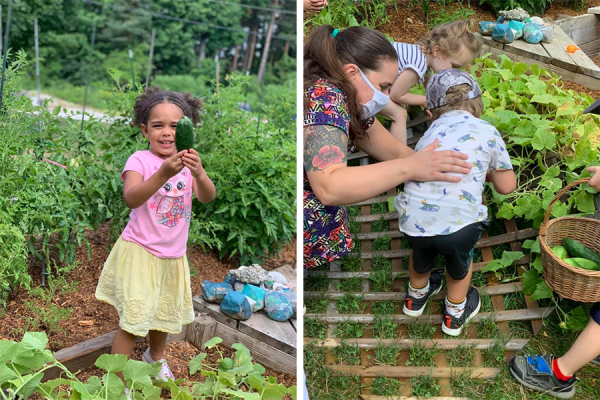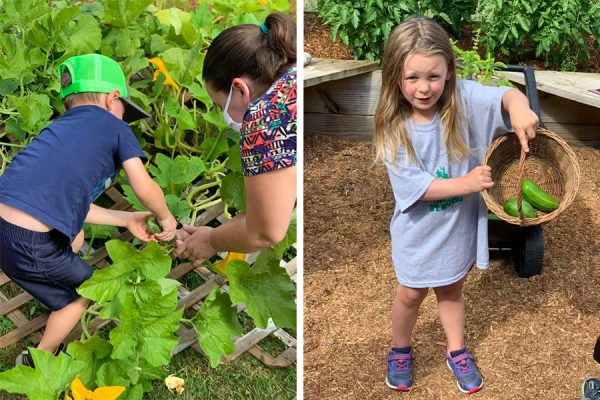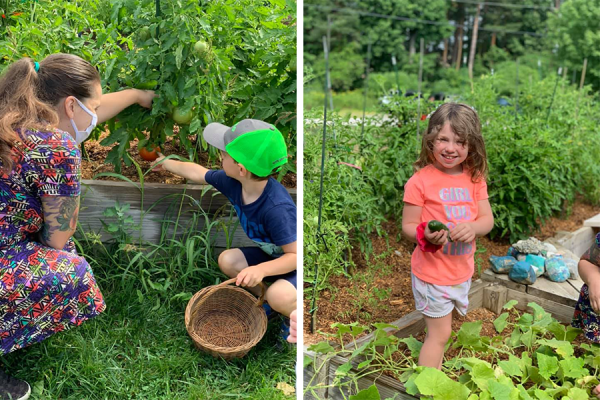A Farm to Early Childhood Update with Cynthia Greene
Like most aspects of the world, the COVID 19 pandemic has greatly impacted Vermont's early childhood system, and programs are struggling to remain open during this time of critical childcare needs. Feeding our youngest children healthy food, providing professional development and coaching support to Vermont’s early educators is an integral focus for Farm to Early Childhood coach, Cynthia Greene of Vermont FEED (our Farm to School partnership project with NOFA-VT). Cynthia shares an update from Vermont’s early childhood community:
How are Farm to Early Childhood programs feeding families in their community? How have they needed to pivot?
The programs I work with have pivoted to meet COVID health requirements and kept their programs open and available to essential workers needing childcare in the early weeks of the pandemic. Now, they are open for their community families, as well. All of these programs offer meals to children through the federal CACFP program, and some have even worked to ensure that families receive extra take-home food through vegetable gleaning and garden crop sharing programs. To make sure families maintain access to food, early childhood programs share food security information with families, including connecting families to school districts serving summer meals, Hunger Free Vermont’s COVID dedicated web pages, and SNAP and WIC resources.
While Farm to Early Childhood activities are being carried out in individual classrooms, program-wide, hallmark events like community dinners, family taste tests of new foods, animal investigations (like hatching chicks), cooking with children, farmer visits, and field trips have been placed on hold. We are seeing programs getting children outside for more nature-based learning.
What are some ways you’ve seen program staff come together to creatively address a challenge?
Some programs have developed or focused on onsite gardening this year as a means of connecting to nature and expanding their own learning about gardening. Staff have devoted non-work hours to organize raised bed building days, planting days, and worked to ensure an equitable classroom schedule so all children could gain access to the garden space. As Community Impact Director of the Parent Child Center of Rutland County Beth Miller shared,
“In early spring of 2020, we excitedly began planning our gardens. We received a grant from the Vermont Community Garden Network to build raised beds at our Chaplin site, received seeds from NOFA-VT, and secured upcoming plant starts from local growers. All was going well until March when Vermont went into lockdown due to the coronavirus. Our plans for the gardens were dashed, and the hands-on Harvest of the Month curriculum shifted to online learning.
But RCPCC was not wholly discouraged! In June, when we were able to reopen, we began again. By July 1, with masks and social distance, we built our raised beds. And with attention to social distance, the children planted the seeds and root-bound plant starts. Nothing could stop the plants from growing and bearing fruit! The children anxiously wait for each vegetable to be ready for picking. Harvest of the Month is back to hands-on learning. July’s harvest was cucumber - everyone’s favorite. The kids made pickles with their teachers and kitchen staff, enough to send home with the parents.”
Other teams have investigated virtual opportunities such as farm tours and the farmer correspondence program to connect children to farms. Additionally, some programs shared virtual lessons, like those from Shelburne Farms, with families to access for at-home learning.
What menu items are working in this new system? Have you been able to use local food? How have the kids and/or families responded to the new foods? Can you share any tips?
Sourcing local food has not been too difficult during the pandemic. In fact, some early childhood programs have been a reliable market for local farms and producers when schools closed and/or shifted to grab-and-go meals. Programs are procuring local fruits, berries, vegetables, eggs, and meat.
What are your big dreams for Vermont’s Farm to Early Childhood programs? What would you like to see on the other end of the pandemic?
Most of the programs I’m working with have maintained their big dreams for Farm to Early Childhood programming. They’re still dreaming and planning for learning kitchens, robust educational gardens, farm field trips, serving more healthy local foods, and offering whole-family community events. While COVID is impacting their Farm to Early Childhood pace and scale, it has not diminished their commitment to, or vision for, healthy, nourished, and nurtured children and families.
See more Vermont FEED information and resources on Farm to Early Childhood here.
All images from the Parent Child Center of Rutland County, summer 2020.


